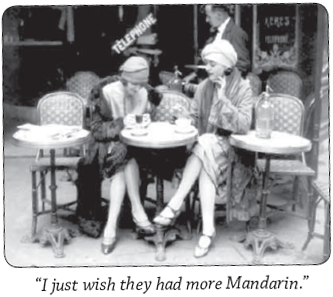Diary of an Expat in Singapore (38 page)
Read Diary of an Expat in Singapore Online
Authors: Jennifer Gargiulo

 You head to Takashimaya. Nothing says Singapore like Jo Malone face cream.
You head to Takashimaya. Nothing says Singapore like Jo Malone face cream.When in doubt, my motto is: head to Takashimaya. Located in Ngee Ann City along Orchard Road, don’t let the Japanese name throw you (okay, it is in fact Japanese). It is one of the finest malls around. And did I mention the
free
coffee in the basement? Small tip: Feign interest in the Nespresso machines before explaining how you like your cappuccino made.
 At some point during the first class, you wonder if you are still in time to get your deposit back. You’re not.
At some point during the first class, you wonder if you are still in time to get your deposit back. You’re not.Learning Mandarin is hard. Short of labour, I can’t think of anything harder. It is so hard that if my son had happened to ask me if he could stop studying Chinese, I would have capitulated. “My goodness, yes. I had no idea. You poor thing, of course you can stop.” Luckily he didn’t ask – not after my first class anyway. Timing is everything. And now my attitude is: “If you made it this far…” I have heard him laughing with his Chinese tutor… in Chinese. Sorry, but if you are
laughing
in Chinese, there is no such thing as quitting. Now if you’re looking back in a blank and vacant stare at your teacher, like I do, that’s another story entirely.
 Time hasn’t passed this slowly since high school math.
Time hasn’t passed this slowly since high school math.You’re living in the country so you want to learn the culture and speak the language. Well, kudos to you. But if you really want to fit in just learn Singlish. It’s way easier. True, Chinese is spoken by over one billion people… but how many actually had to
learn
it with a dictionary?
 You finally understand what your son’s Chinese name means.
You finally understand what your son’s Chinese name means.Years ago, when I lived in Dublin and taught English at a language school on O’Connell Street, I had a class which was made up entirely of Chinese students. In fact, my colleagues suspected that our school was really just a visa front. The students, who stayed with Irish families, complained about the food, especially the excessive butter and lack of rice (this could explain why they brought fresh eel to the class, a smell that didn’t exactly endear them to the teachers). Anyway, they all had self-appointed English names which sounded slightly surreal. The introductions went something like this: “Hello, my name is Li Xiaowu. English name Buddy.” Buddy? Really?
Years later, when my own son needed a Chinese name, it didn’t seem so funny.
So when the teachers in my Chinese class (who also teach Alexander) ask me what his name Ah-Liu means, I assume it is a trick question since it’s Alexander’s self-appointed Chinese name. “Soaring Eagle?” I sheepishly reply (vaguely remembering finding his name on a ‘Get A Chinese Name’ website when we first arrived in Singapore). “Oh, no! No soaring eagle (huge grin). Ah-Liu means:
stay there
.” What? The name my son has been using for the past three years in Chinese class means
stay there
? And I’m the one who found it for him. “Uhmm son, about that name Soaring Eagle… it may not be the cool name we originally thought it was.”
 Your children are your harshest critics.
Your children are your harshest critics.When I try out my Mandarin on Alexander, he just shakes his head and says: “Sorry Mom, I have no idea what you’re saying. You’re getting the tones all wrong.”
 The camaraderie in class is based on grammar mistakes and mutual misunderstandings.
The camaraderie in class is based on grammar mistakes and mutual misunderstandings.There are only about four people in the Mandarin class, all expat parents, and we do have occasional laughs. Usually involving the pronunciation of words and the discovery that
he
means ‘drink’ but also means ‘box’. And that
gege kele he shui
means ‘brother thirsty, drink water’; but accidently change the order and you might end up with ‘drink your thirsty brother’.

 You hear about Japanese-Chinese fusion cuisine.
You hear about Japanese-Chinese fusion cuisine.Whether you’re from Rome, Paris, or Omaha, Nebraska, chances are you have never heard of Japanese-Chinese fusion cuisine. Chances are most Japanese and Chinese have never heard of it either. Maybe one or the other, but fusion? Not likely. Singapore is the place to expand your culinary horizons. And a coffee morning, organized by your kid’s class rep, is the best place to do it.
 Life in Singapore is compared to life in Dubai. Singapore wins.
Life in Singapore is compared to life in Dubai. Singapore wins.At a parents’ coffee morning in Singapore, unlike one say in Verona (where everybody comes from Verona), everybody is from somewhere else. Consequently, there will be comparisons and conclusions. Pollution in Beijing, heat in Bahrain, squid-carrying moped drivers (not to be confused with moped-carrying squids… that would be weird) in Bangkok. Over coffee, world cities are analyzed with a degree of scrutiny comparable to that of future in-laws assessing a potential bride. Expat parents are like a convention of experienced urban planners: which city has the best schools, best transportation system, or best housing developments? And just how much better is Singapore? And, does that algorithm take into account the humidity?
 At least one parent is a Brahmin healer.
At least one parent is a Brahmin healer.